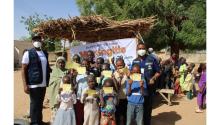Saving lives in northwest Nigeria with the new MenFive vaccines
Dutse, 8 May, 2024 - It was around 10 am when 55-year-old Usman Alasan, with his megaphone got to the nomadic settlement of Dongawaki, located at Sule Tankarkar Local Government Area (LGA), in Jigawa State, to announce the arrival of the vaccination team.
A few minutes later, Ramatu Ali, a mother of five, who had almost lost her 12-year-old son Ambali, to meningitis some weeks earlier, left her chores to gather all the children in her compound to the vaccination post situated opposite her home.
The children received the new meningitis vaccine (called Men5CV) that protects against five strains of meningitis.
Ramatu says “They must all get vaccinated because I don’t want any of my family or relatives to have such an experience.”
Recalling the near-death incident of her son, she says “The community had thought he was dead when suddenly opened his eyes and was rushed to the hospital. He was sick earlier, running temperature and complaining of a headache.
Ambali received free treatment at the General Hospital in Gumel, with support from the Jigawa State Government, Medeccins San Frontieres (MSF) and the World Health Organization (WHO). Although recovered, Ambali still has sores on his body as a result of the ailment.
In Nigeria, an outbreak of Neisseria meningitidis (meningococcus) serogroup C outbreak led to 1742 suspected meningitis cases, including 101 confirmed cases and 153 deaths in seven of 36 Nigerian states (Adamawa, Bauchi, Gombe, Jigawa, Katsina, Yobe, Zamfara) between 1 October 2023 and 11 March 2024.
To quell the deadly outbreak, a vaccination campaign was undertaken on 25 - 28 March 2024 to initially reach more than one million people aged 1-29 years.
Ambali and his mother in front of his compound after recovery from meningitis
For the campaign, the government of Nigeria through the National Primary Healthcare Development Agency partnered with the WHO and Gavi, the Vaccine Alliance pioneered the use of Men5CV which offers a powerful shield against five major strains of bacteria (A, C, W, Y and X) in a single shot.
“Meningitis, a vaccine-preventable disease, is causing unnecessary and preventable deaths in many populations. WHO has prequalified the Men5CV vaccine as safe and effective, capable of preventing future outbreaks and saving lives by protecting against the five bacterium types causing meningitis. WHO urges partners and other stakeholders to join hands with governments in eliminating meningitis by 2030 and assures continued support in maximizing vaccine benefits in Nigeria. says the WHO Country Representative in Nigeria, Dr Walter Kazadi Mulombo.
In the three states (Jigawa, Bauchi, and Yobe) where the campaign took place, the target population were covered at 103%, 101%, and 45% respectively.
“Most of our children have received the vaccine. We want to prevent sickness and deaths from meningitis across our villages,” said Mukarram Rabilu, the village head of the Fulani nomadic settlement who took his time to stand at the vaccination post to monitor the exercise.
Meningitis is a serious infection that leads to the inflammation of the membrane surrounding and protecting the brain and spinal cord. Meningitis according to WHO, is transmitted from person to person through droplets of respiratory and throat secretion.
During the campaign, Mr Hassan Shehu Usman, an official from NPHCDA, said additional vaccination centres had been set up to ensure the effective administration of vaccines to individuals aged one to 29.
He also highlighted the intensification of an awareness campaign to educate people about the importance of immunization.
To implement the campaign, WHO, played a vital role in providing leadership, coordination, and support to the Nigerian government in their request for the new MenFive vaccines from the stockpile of the International Coordinating Group (ICG) on Vaccine Provision.
Additionally, WHO supported the training of health workers on vaccination skills, surveillance of adverse events following immunization (AEFI) and good practices to ensure the smooth implementation of the campaign.
The campaign was successful, with 1,003,945 individuals vaccinated in high-risk areas as a result of the collaboration with other development partners, including UNICEF, healthcare workers, government officials, and volunteers.
The conjugate vaccine was developed in partnership between PATH and the Serum Institute of India and funded by the UK government’s Foreign and Commonwealth Office.

